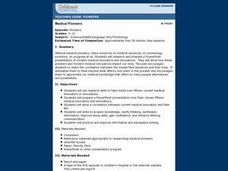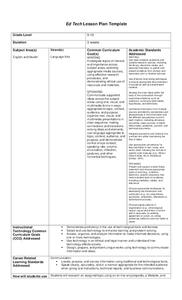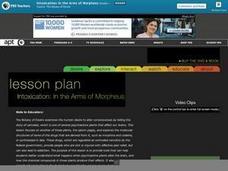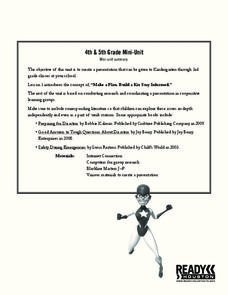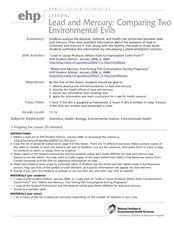Curated OER
Is That a Fact?
Investigate popular scientific claims and gather evidence to defend or argue against an author's stance. Writers synthesize information and compose their own "Really?" columns modeled after those found in the weekly "Science Times"...
Curated OER
Critical Consumerism
Develop critical thinkers and awareness of the media's techniques. Impressionable minds analyze advertisements they see all around them in this potentially 3-week long unit of five complete lesson plans. Extended discussions, outside...
Curated OER
Defining Character, With Help from History
In a single, soundly-designed class period, high schoolers define good character, think-pair-share about thought-provoking quotes on character (More options would enhance the discussion, worth searching online for other quotes to add.),...
Curated OER
Controlling Bleeding Emergencies
Young scholars practice first aid. Through role play, students analyze and synthesize solutions for bleeding emergencies. Each student works with a partner to perform first aid skills to control bleeding in mock emergency situations.
Curated OER
Nothing to Sneeze At
Learners explore allergic reactions; they then synthesize their knowledge by creating informational pamphlets that help new allergy patients research the nature of allergies.
Curated OER
This Is Your Brain on Pot
Students explore the causes and effects of marijuana addiction and research how THC affects different areas of the brain. They synthesize their knowledge by creating print advertisements that inform teenagers about the physiologic danger...
Curated OER
Redefining Addiction
Students study about how addiction can have both physiological and behavioral effects. They synthesize their knowledge by creating a sensitivity training session for counselors working with teenagers who are addicted to drugs.
Curated OER
Diagnosing Delusions
Students see how widespread medical myths can be potentially dangerous. They synthesize their knowledge by creating pamphlets that help patients learn the facts behind some commonly believed medical myths.
Curated OER
Fit To Play?
Students research certain sports-related injuries and who may be at risk for these conditions. They synthesize their knowledge by collectively developing a comprehensive medical history form.
Curated OER
Medical Pioneers
Students use research skills to take notes over fifteen current medical innovators or innovations. They prepare a PowerPoint presentation over their chosen fifteen medical innovators and innovations. Students show a correlation between...
Curated OER
Ed Tech
Students access and evaluate authority of electronic resources. They synthesize data from multiple sources. Students compose a Works Consulted page. They prepare and deliver an informative speech on a disease or medical condition.
Curated OER
Lead and Children: Toxic Exposure!
Students access the Thinkport website to read, synthesize, and summarize information regarding lead poisoning. They write brief constructed responses to a research guide concerning lead poisoning.
Curated OER
Don't Believe the Hype
Are hand sanitizers good for you? What about the environment? Research the science behind commonly used cold medicines. The class reads an article, creates a product poster, and conducts independent research on product claims made by...
Curated OER
Do I Need Insurance?
Explore the different types, costs, and coverage of insurance. High schoolers compare their family's health care to their income, compare the cost of health insurance to their expected future income, and make a choice about what type of...
Curated OER
Intoxication: In the Arms of Morpheus
A comprehensive lesson that takes a look at psychoactive plants with this one focusing on the opium poppy. Information about the history, culture, use, source and effects are discussed. There are weblinks to reliable sources about drugs...
Ready Houston
Make a Plan. Build a Kit. Stay Informed.
What is an emergency, and how can having a plan help make emergency situations safer? Pupils are tasked with creating a short presentation that can help teach younger children about emergencies, community helpers, and first...
Serendip
Vitamins and Health – Why Experts Disagree
Should people take vitamins or get the needed minerals through diet? Experts disagree based on many different factors. Scholars compare study findings and discuss the differences. They learn the importance of comparing results across...
Curated OER
Children of Alcoholics Group
Ninth graders identify characteristics of alcoholism, resources available to them and their family within the community and school, and look at strategies to help them increase safety and anger management strategies too.
Curated OER
The Heart of the Matter
Upper elementary pupils learn about the blood transportation system and anatomy of the human heart. They fill in an outline of the human heart (not included) focusing on the flow of blood to and from the heart. Using stethoscopes,...
Curated OER
Jelly Bracelets: Fashion or Sex Game?
Ever-changing fashion fads are the ideal context for an engaging sociology experiment for adolescents. Through research and conducting a survey, learners draw conclusions about the controversial jelly bracelets fad, banned in some...
Curated OER
Lead and Mercury: Comparing Two Environmental Evils
High schoolers in chemistry or health courses look at the material safety data sheet (MSDS) and periodic table of elements to gather information about mercury and lead, two toxic materials that have been found in food products. They read...
Curated OER
The Eyes Have It
Students explore the health risks associated with wearing decorative contact lenses. They research other cosmetic modes of expression that can pose health risks and debate whether these practices should remain legal.
Curated OER
Weight Training
Students conduct a class-wide survey collecting, compiling, and analyzing data about fitness, weight loss, and body image issues. They analyze the relationship between exercise and diet in weight control.
Curated OER
Changing Times, Changing Strategies
Learners explore the C.D.C.'s efforts to become better equipped to battle bioterrorism; they then discuss surveillance, epidemiological, and communications issues related to their program.









